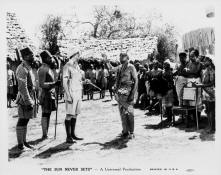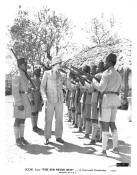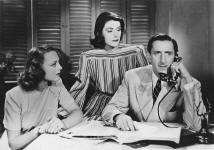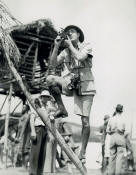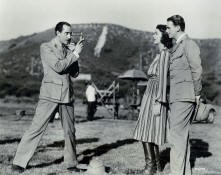The
Sun Never Sets
|
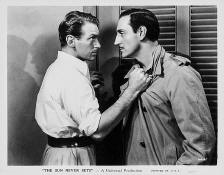 John (Doug Fairbanks Jr.) tries to stop his brother (Basil Rathbone) from leaving. |
Doug Fairbanks Jr. and Basil Rathbone |
"The strength of this film is that it successfully pulls off a moving, human drama, as well as a wartime espionage adventure. The main characters, especially in the early scenes with the rest of the family, come off so real and human that the film warms itself to the audience right then. We care about these characters, about their victories and defeats, and that, of course, is the key to nearly any good narrative film." —Samuel Stoddard, At-A-Glance Film Reviews
"Some of the film is so interesting that it is with reluctance that you find yourself thinking the rest of it is kind of silly." —Hollywood, September 1939
|
THE SUN NEVER SETS Generations of Randolphs have been true to the British Colonial Service until the youngest member rebels. The tradition of the family is great enough, however, to swerve him from his purpose, but in acquiescing he feels he has been run over by an Empire. Later, a crisis which involves his own career and that of his brother brings forth a latent sense of nationalism. Argentina raises cattle, China raises tea, but England raises sons, and these sons are sometimes sent to the most farflung corners of the Empire to take with them British law and British tradition, in spite of heat, rains, fever, and hostile natives. This particular son is sent to the Gold Coast in Africa. His initial experience makes an exciting tale of adventure. The plot is absorbing, made believable by the sincerity of the cast, its flaws apparent only in retrospect. There is a thrilling climax which seems rather fantastic, but one has only to read the daily newspapers to find that fact is stranger than fiction. To appreciate thoroughly the powerful traditional force which sends young men of fine families to remote, obscure, uncomfortable posts without a what's-in-it-for-me motive, one need not be British, but it might help. Adolescents, 12 to 16 Children, 8 to 12 |
"Built on a preposterous story premise, hampered by hammy and heavy handed direction and confused production approach, which never gives the players a chance to break through with conviction, The Sun Never Sets misses badly. ... Talent of a first class company, struggling vainly to overcome the various handicaps, is wasted on the inept vehicle, meandering along for 98 minutes with material which hasn't the jelling quality for half that footage. Even for the British provinces, where the tale of empire and duty on the danger lines may have been expected to get favorable response, the plot and palaver about the Service and family honor has been over-sentimentalized in maudlin degree. ... Fairbanks, Rathbone, Atwill, Barbara O'Neil, Virginia Field, C. Aubrey Smith, Melville Cooper, Mary Forbes in principal roles make valiant effort to give fable life and credibility." —Daily Variety, June 1, 1939
"[The film is] rather far-fetched, but awfully exciting at times." —Silver Screen, September 1939
"This film is a bit of a muddled mess, and hasn’t aged well at all." —Sylvia Bagley, FilmFanatic.org
The Sun Never Sets is "... a comic-book salute to The Empire which, like Son of Frankenstein, overshot its budget and shooting schedule." (Universal Horrors, 2007)
|
The Sun Never Sets Powerful Story of Dauntless Courage on African Gold Coast Should Make Money Plot: Although he revels at the idea, Fairbanks, Jr., follows the family tradition and joins the service. He is sent to the African gold coast, where his brother, Rathbone, is district commissioner. Pretending to accept Atwill's undercover offer to help him plunge all Europe into war, he averts trouble just in time by having Atwill and his henchmen destroyed. SUMMARY: Demonstrating again the English family tradition of service for the Crown, this powerful story of dauntless courage on the African Gold Coast should be O.K. for top billing and good grosses. It is suspenseful, dramatic entertainment with plenty of human interest and producer-director Rowland V. Lee has skillfully handled it from all angles. Well cast and splendidly acted, it has Douglas Fairbanks, Jr. and Basil Rathbone in the leading roles and a superb supporting cast headed by Barbara O'Neill and Melville Cooper. Dress doormen and usher in white uniforms and helmets. Use the names of the two leads in all your advertising. OUTSTANDING: Douglas Fairbanks, Jr. and Basil Rathbone Catchline: "No sacrifice was too great to uphold the family tradition." —Showmen's Trade Review, June 3, 1939 |
"Basic story wanders and flounders. ... Players cannot be blamed for their ludicrous lines and actions in supposedly tense situations. It's just bad basic material unaided by direction. Basil Rathbone has had too many good performances behind him to be blamed for his shortcomings in this one." —Variety, June 7, 1939
"This is nothing more than a feeble B story with the dressings and cast of an A production. The yarn, intended as a sort of cavalcade of the British Diplomatic Corps, boasts a wild, overly melodramatic plot, made still less entertaining by hammy dialogue and tedious, meaningless situations." —Hanna, Independent Exhibitors Film Bulletin, June 12, 1939
 |
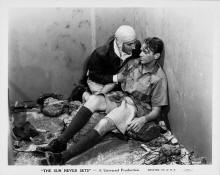 Doug Fairbanks Jr. and Basil Rathbone |
 |
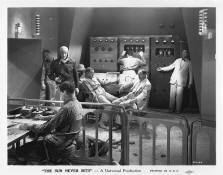 |
"The Sun Never Sets is Hollywood's tribute to the British Empire, as represented by the Randolphs." —The Bystander, 12 July 1939
"It is not the British Empire on which 'The Sun Never Sets,' but the imagination of Hollywood's elfin script-writers. Their lively fancy has carried them in this case from a solemn dedication to the Colonial service, with which they began the picture, into the realm of pure nonsense where dwells an incipient world-dictator." —Frank S. Nugent, The New York Times, June 9, 1939
|
THE SUN NEVER SETS Meandering, maudlin melodrama about the British Randolphs, their tradition of duty in the Colonial Service and the destruction of a villainous munitions maker who is trying to embroil the world in war. (Adults & Young People) With its familiar tag title, The Sun Never Sets could be nothing but a glorification of British imperialism and it turns out to be so worshipful of the glories of that imperialism, so sentimental in its regard for the stiff-upper-lip and whiskey-and-soda heroics, that it is almost a burlesque of its type. In the past the Randolphs have been a major reason why the sun never sets on the British Empire. Old Sir John Randolph is ready to supply proof. In the present young Clive Randolph has been doing his duty as a commissioner of the African Gold Coast, but brother John has been a slacker, has abstained from following family tradition and joining the Colonial Service. Clive has just returned to England for home duty, when he is dispatched again to the Gold Coast to discover the source of sinister radio broadcasts which are threatening the peace of the world. A cold-blooded munitions magnate, posing as an eccentric scientist, has established a powerful station there to further his schemes to sell munitions materials and eventually become world dictator. Old Sir John at last convinces young John that he should go with his brother. Clive's wife is with them in Africa and is expecting a baby. Clive is called up country — and John, who as yet does not know that imperial duty must always come first, sends a fake message to bring him back. Clive is disgraced — but John gloriously vindicates himself and the Randolph name by discovering the radio hideout and signaling the location just before the crucial broadcast. Back in London the Home Office is in despair: "If we don't stop it, the world will be in for it." But the bombers arrive in time and British heroism has saved the world. The cast is long and strong; there is scarcely a person listed who can not be credited with many fine performances in previous pictures. They can, however, impart little conviction to the ludicrous lines and meandering scenes given them by the script, which offers more talk than action. The physical production is handsome, reflecting a heavy budget, and occasional scenes leap into sharp focus as such stalwart players as Basil Rathbone, C. Aubrey Smith and Melville Cooper force vitality into the mediocre material. In general The Sun Never Sets seems a class A picture that slipped down the alphabet. —The Movies ... and the People Who Make Them, June 1939 |
"The melodrama did give Rathbone a superb scene, however, in which two personal tragedies, as well as the strain of his job, cause him to suffer an emotional breakdown. Unfortunately, any positive effect scenes like this were to have on the production was diluted by the preposterous and heavy-handed situation of the would-be dictator hiding in his secret malalidium mine." —Michael Druxman, Basil Rathbone: His Life and His Films, 1975
"Rathbone is excellent as the older brother." —Los Angeles Examiner
CANDID PHOTOS:
Return to Page One of review. See Page Three for pictures of posters, lobby cards and promo photos.








